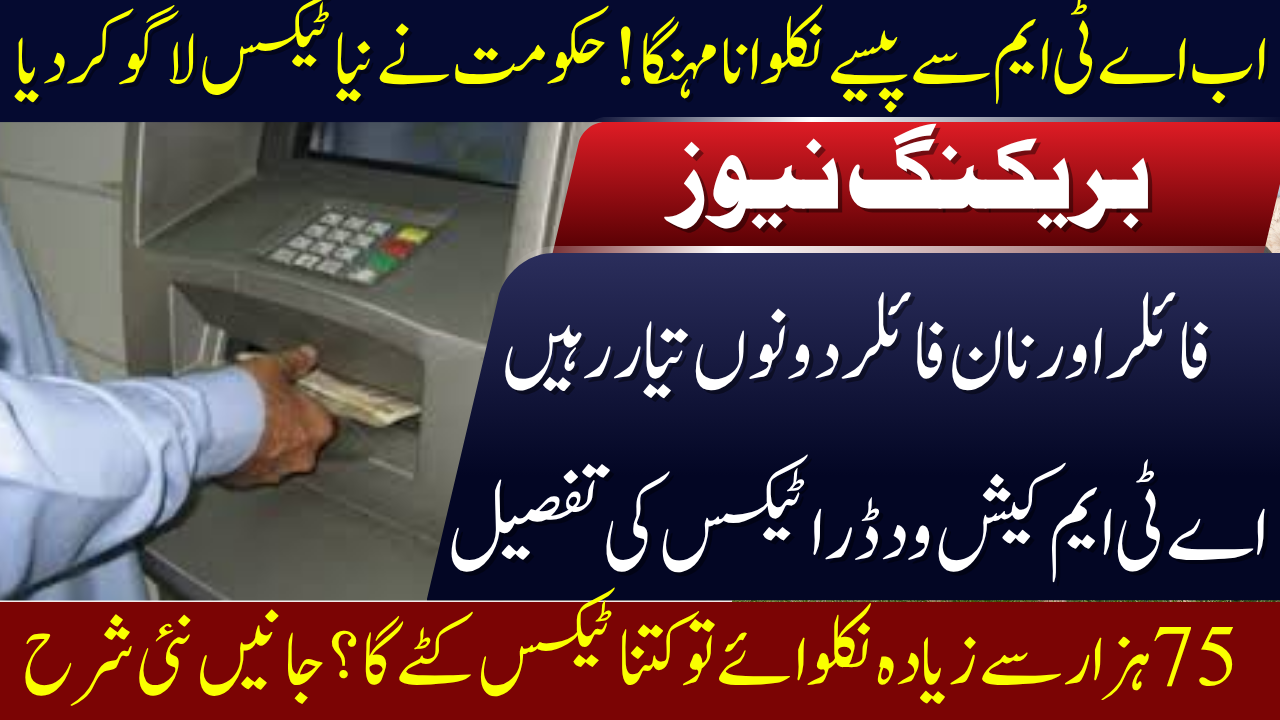ATM Cash Withdrawal Tax
The Government of Pakistan has introduced fresh changes in the ATM cash withdrawal tax system for 2025, aiming to bring more people into the tax net and discourage heavy cash usage. These changes will impact both filers (registered taxpayers) and non-filers (unregistered individuals), making it important for every bank account holder to understand how much tax they will pay while withdrawing cash.
Background – Why ATM Tax Exists
The ATM cash withdrawal tax, also known as withholding tax on cash withdrawals, was first introduced to track the flow of unreported money. Many people in Pakistan prefer to deal in cash instead of using digital transactions, making it difficult for the government to monitor income and spending.
By applying a tax on ATM and bank withdrawals, the government pushes citizens to either file tax returns (to pay a lower rate) or switch to digital payments, which are easier to trace.
New Changes in 2025
The 2025 federal budget has brought major revisions to this tax. Let’s break down what has changed this year:
1. Higher Tax for Non-Filers
Non-filers will now face a tax rate of 1.2% on their daily cash withdrawals once they cross the set limit. Previously, this rate was 0.6%, but the government has doubled it to put more pressure on non-taxpayers.
2. Increase in Daily Limit
Earlier, the tax applied when daily withdrawals exceeded Rs. 50,000. In 2025, the government has raised this limit to Rs. 75,000. This means smaller account holders won’t feel the burden immediately, and the tax will mainly target bigger withdrawals.
3. Filers Also Included
For the first time, even filers will pay a small tax on large withdrawals. If a filer withdraws more than Rs. 50,000 in a single day, they will now pay 0.3% tax on the withdrawn amount.
4. Strict Monitoring System
Banks have been directed to automatically deduct this tax at the time of withdrawal. Additionally, the Federal Board of Revenue (FBR) will match withdrawal data with CNIC and tax records to ensure no one escapes compliance.
Example Scenarios
To understand the new policy, here are some simple examples:
- Case 1 (Filer): You withdraw Rs. 60,000 in a day. A tax of 0.3% applies = Rs. 180 deduction.
- Case 2 (Non-Filer): You withdraw Rs. 100,000 in a day. A tax of 1.2% applies = Rs. 1,200 deduction.
- Case 3 (Small Withdrawals): You withdraw Rs. 40,000 in a day (whether filer or non-filer). No tax applies.
Purpose of the New Tax
The government expects these changes to:
- Encourage more people to file taxes to enjoy lower rates.
- Reduce heavy cash circulation and promote digital banking.
- Increase national revenue without introducing new indirect taxes.
- Bring transparency to Pakistan’s undocumented economy.
Public Reaction
Many Pakistanis are divided on the policy. Salaried class filers argue that they already pay income tax and should not be taxed again on cash withdrawals. On the other hand, experts say this light tax on filers is meant to balance fairness, as non-filers face a much higher rate.
Small shopkeepers and daily wage earners, however, fear that increased banking costs may discourage people from using bank accounts altogether. To counter this, the government is offering incentives for digital payments and encouraging online transfers, which remain tax-free.
Tips to Reduce Your ATM Tax Burden
- Become a Filer – Filing your annual tax return will cut your withdrawal tax rate significantly.
- Use Digital Banking – Pay via debit card, mobile apps, or bank transfers instead of withdrawing large amounts of cash.
- Plan Withdrawals – Spread out withdrawals over several days to stay under the daily limit.
- Check Bank Statements – Always review your account deductions to ensure the tax is correctly applied.
Final Thoughts
The ATM Cash Withdrawal Tax 2025 is part of Pakistan’s wider financial reforms to increase tax collection and reduce cash dependency. While non-filers face a steep penalty of 1.2% for daily withdrawals above Rs. 75,000, even filers are now required to pay a small 0.3% charge.
For the average citizen, this means smarter financial planning is essential. By filing taxes and shifting toward digital payments, individuals can not only save money but also support the vision of a documented, transparent economy.
